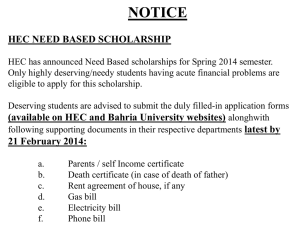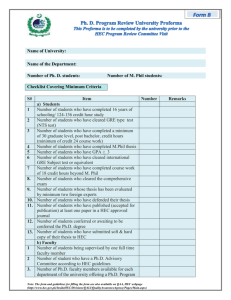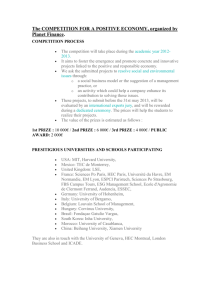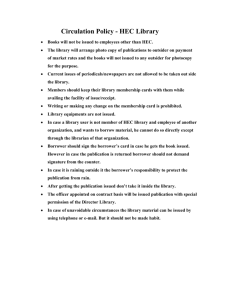Dr Javaid Laghari
advertisement
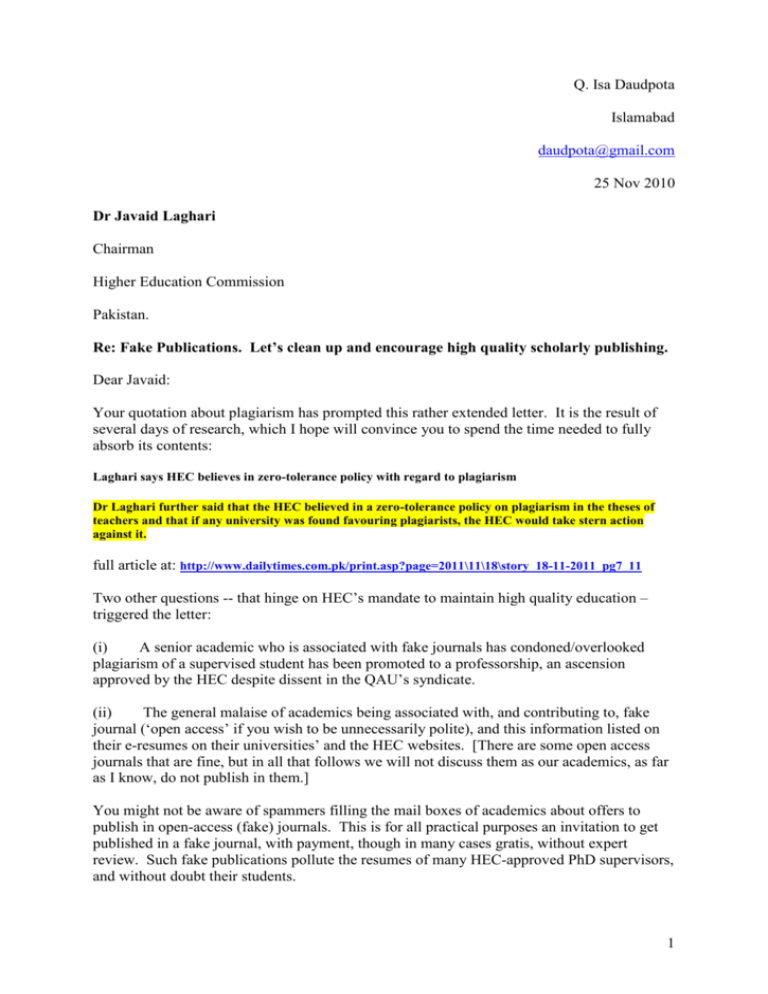
Q. Isa Daudpota Islamabad daudpota@gmail.com 25 Nov 2010 Dr Javaid Laghari Chairman Higher Education Commission Pakistan. Re: Fake Publications. Let’s clean up and encourage high quality scholarly publishing. Dear Javaid: Your quotation about plagiarism has prompted this rather extended letter. It is the result of several days of research, which I hope will convince you to spend the time needed to fully absorb its contents: Laghari says HEC believes in zero-tolerance policy with regard to plagiarism Dr Laghari further said that the HEC believed in a zero-tolerance policy on plagiarism in the theses of teachers and that if any university was found favouring plagiarists, the HEC would take stern action against it. full article at: http://www.dailytimes.com.pk/print.asp?page=2011\11\18\story_18-11-2011_pg7_11 Two other questions -- that hinge on HEC’s mandate to maintain high quality education – triggered the letter: (i) A senior academic who is associated with fake journals has condoned/overlooked plagiarism of a supervised student has been promoted to a professorship, an ascension approved by the HEC despite dissent in the QAU’s syndicate. (ii) The general malaise of academics being associated with, and contributing to, fake journal (‘open access’ if you wish to be unnecessarily polite), and this information listed on their e-resumes on their universities’ and the HEC websites. [There are some open access journals that are fine, but in all that follows we will not discuss them as our academics, as far as I know, do not publish in them.] You might not be aware of spammers filling the mail boxes of academics about offers to publish in open-access (fake) journals. This is for all practical purposes an invitation to get published in a fake journal, with payment, though in many cases gratis, without expert review. Such fake publications pollute the resumes of many HEC-approved PhD supervisors, and without doubt their students. 1 AIJCR of CPI and Lubna Ali of QAU Here I am concerned with the particular case of Dr Lubna Ali, Chair of the International Relations Department, QAU. Her resume is at: www.qau.edu.pk/betaqau/profile.php?id=813003 I do not know the lady but learned about her through an email solicitation of a journal American International Journal of Contemporary Research (AIJCR), which showed her to be its editorial board: http://aijcrnet.com/index.php/editorial-board This is one of the publications of the Centre for Promoting Ideas (CPI), which is listed in her resume, of which a part is reproduced below: [She is] Global Member of CPI: Center for Promotion Ideas, Publishing Organisation of International Journal of Business and Social Sciences [IJBSS], International Journal of Applied Sciences and Technology, International Journal of Humanities and Social Sciences, U.S.A Prepare for a long detour now. We will return to Lubna Ali before long… [Dr Fazalur Rahman of Allama Iqbal Open University happens to be the other Pakistani social scientist on the AIJCR Editorial Board. And then there is Dr Zawar Hussain of QAU Stastistics Department, plus Dr Huma Baqai of IBA, Karachi. The HEC and QAU websites respectively show that they have contributed extensively to the IJBSS of the above CPI family.] The crummy look-and-feel of the AIJCR website (see URL above) is an instant giveaway, showing that this is one of those fake open access journals. Take a look at the logo of CPI that appears on the top left hand corner and note the spelling: Centre. As you know Americans don’t spell it this way! I wished to explore more about the journal, so I wrote off to Dr Matthew Sanders who appears at the top of the list of the extensive Editorial Board. He replied saying that he did not know anything about this journal! A peek at its International Advisory Board threw up three more Pakistanis: Dr Masood Sarwar Awan, Assistant Professor & Coordinator MPhil & PhD Programme, University of Sargodha, Sargodha, Pakistan Dr Farah Malik, Chair, Department of Psychology, GC University, Lahore, Pakistan. Dr Talat Afza, Professor and Head of Academics, COMSATS Institute of Information Technology, Lahore Pakisatn [sic]. So there are 7 Pakistani academics, including Lubna Ali, associated with just this “international” journal. This alone ought to have rung alarm bells in the Pakistani academic community! I then chose a person from Ottawa University (a place of some prestige) to ask how his name could possibly got onto such a journal’s board. This is what he wrote back: 2 Thank you for bringing this matter to my attention It is news for me, I have never been asked to be member of the advisory committee of this journal. And it is the first time I hear about it. If I can be of any help please do not hesitate. Daniel Zéghal, Ph.D., FCGA Welch & Co., Professor of Accounting Executive Director, CGA-Accounting Research Centre Telfer School of Management University of Ottawa 55 Laurier E. (7104) Ottawa, ON, K1N 6N5 Canada zeghal@telfer.uOttawa.ca I have requested him to get his university legal department to push for closing this journal’s site. More about closing down websites a bit later. Having explored the above journal reasonably well I decided to look at its sister journal, the International Journal of Business and Social Science, which is apparently recognized by the HEC. The above named Pakistanis have all contributed to it, judging from a quick look at their resumes. Dr Lubna Ali most certainly had her article, “Islamic Traditions and Feminism” appear in its April 2011 issue, according to her resume. The “chief advisor” of this journal happened to be Raghavendra Rau, Professor of Finance, Cambridge Judge Business School, University of Cambridge, so I decided to drop him a line to ask whether he knew that his name was being misused. He replied: Thanks, Isa. Someone did send me an email about this and I'll need to get around to asking them to take it down. Thanks for reminding me - it had slipped my mind. Just out of curiosity, how many other fake e-journals have you found? Raghu By the way there is/was also the International Journal of Business and Social Research, which if one is not careful could be confused with the earlier near-identically named journal. Its announcement reached my mailbox on 11th Nov, and I soon sent out a message to all faculty members at Air University to not contribute to it as it was definitely a fake. With a little bit of net research I could get to the university address of its “editor”, with whom I exchanged several emails. The good news just as I write to you is that the offending website has now been closed thanks to the Attorney at the University of Maryland. See the note from the “Editor”: From: Susan Taylor <staylor@rhsmith.umd.edu> To: "Isa Daudpota" <daudpota@mail.au.edu.pk> Date: 11/22/2011 11:45 PM Subject: Re: URGENT - could this be a fake journal? Yes, Isa--Just learned this myself! The Attorney got to the Website Server in Ann Arbor Michigan and the threat work. Hope you are well and making progress on your own cases! 3 Susan Taylor M. Susan Taylor Smith Chair of Human Resource Management & Organizational Change Co-Director, Center For Leadership, Innovation, & Change (CLIC) Department of Management and Organization Robert H. Smith School of Business University of Maryland College Park, MD 20742-1815 staylor@rhsmith.umd.edu http://www.rhsmith.umd.edu This journal has/had Muhammad Aslam Khan, Associate, Professor, Faculty of Business Administration, Preston University Islamabad on its Editorial Board, with his HEC profile at: http://sc.hec.gov.pk/aphds/submit.asp?supid=3684. [My not-so-flattering earlier views on Preston may be obtained by Googling.] Case of the versatile Muhammad Aslam Khan of Preston Wonder what happens to persons such as Muhammad Aslam Khan who find their journals vaporize in ether! The HEC may like to have a chat with him and shock him with the news of the vanishing of his fake journal! But let’s not leave this very interesting case as he links up with numerous publishing and conference rackets around the country! He, a PhD from NUML University, not exactly known for its academic standard, will actually not be worried. If you google him as I did he appears on the board of many such journals: http://tinyurl.com/cbg8wkt . [If interested you may like to google my old articles on the infamous NUML, which lies in HEC’s neighborhood.] Dr Khan, an HEC-approved PhD supervisor, appears on the HEC listing of faculty at http://sc.hec.gov.pk/aphds/submit.asp?supid=3684. You will find him moonlighting at the University of Lahore, Islamabad Campus as well as the Iqra University, according to this webpage. This man is prolific. He has published 9 foreign journal articles this year until 2 July, which is when data on your site was updated. Seems he was a bit slack and only managed 11 articles in 2010! Needless to say these are HEC-approved journals -- according to his HEC profile. Not surprisingly they are ones on which he is on the editorial board, including the African Journal of Business and Management which, believe it or not, has 4 editors from Pakistan! Check: http://www.academicjournals.org/AJBM/Editors.htm At this point you may like to look further down for the url of Jeffery Beall’s two articles in which you will find that this journal and others in its family have their origin in Punjab’s industrial town, Faisalabad! We are not done yet with the versatile Mr Khan of Preston. Courtesy of his many papers, he has managed many foreign junkets, in fact 13 in the past 5 years. Most interesting though is his attendance at a workshop in Lahore on “Research Ethics and Anti-Plagiarism 4 Strategy” – No. 13 on his list of meetings attended! I wouldn’t be surprised if the HEC footed the bill for it. If true, you are allowed a big laugh about it. It is truly mind-boggling that despite all this data available on the HEC website, neither it nor anyone else has tried to understand the achievements of this remarkable man! Clearly, having the right data is only the first step towards positive change. In the above detour I have attempted to make a preliminary attempt to prove that the CPI family of journals, like most open access ones, are fakes. The HEC should investigate them and then aggressively move to get them off the web and compel Pakistani academics associated, as editors or contributors, to sever their connections immediately and remove mention of such publications in their resumes. Benefits, financial and professional, obtained through such publications should be withdrawn. The big fish, in particular, need to be tried in the court of law. Holmes and Watson discover Durrani Let me remind you of the recent outstanding detective work of Zahir Ehrahim and Ehsan Leghari: www.tinyurl.com/c686p34 My earlier interest and involvement in academic fraud was revived by their work. In my note to Dr Ghulam Murtaza (supervisor and reviewer of the work of the offending Dr Ijaz Durrani) of Oct 11, which I had copied to you and other academics, I mentioned this work and the other past oversights of the HEC. My letter was a corrective to what had appeared in emails from the executive director of the HEC stating that: “Dr. Durrani alone is responsible for what he has done and not his colleagues, University of Gujrat, HEC etc… HEC has NEVER condoned any act of plagiarism anywhere.” As part of the dialogue on the Durrani scandal it may be useful to re-read what Dr Abdullah Sadiq wrote: Ijaz Durrani's recent case of plagiarism is the result of ignoring, if not condoning, by the academic community, academic institutions and HEC of a long list of such cases by other individuals and institutions, including his earlier case of plagiarism at Punjab University. Ignoring such malpractices and continuing to associate with such individuals and institutions has led to this shocking state of affairs. Why was an individual who had earlier resigned from the University of the Punjab on plagiarism charges inducted into a senior faculty position and made a Director at GU and an HEC approved PhD supervisor? What about the MSc, M Phil and PhD thesis of GU that he may have supervised? Why did some very senior academicians of the country NOT ring the alarm bells when he presented them his plagiarized books with one of them, a Distinguished National Professor and Abdus Salam Professor even writing or endorsing its glowing review? Why was an obviously fake journal included in HEC’s approved list of journals? 5 To date one hears that Dr Durrani has resigned, but that’s surely not enough! The HEC, given your recent clearly stated stand, ought to tell us how it is tackling this issue on a larger scale and to continually update reports via your website – being candid is vital for any such effort to succeed! Past errors have to be recognized and stated publicly, followed by a speedy, efficient and long-term effort to greatly reduce, if not completely remove, the curse of academic fraud. Zahir Ehrahim and Ehsan Leghari (Sherlock Holmes and Watson in our context) may be consulted to assist in this. The Case of Lubna Ali of QAU Let’s return to the case of Lubna Ali, referred to earlier. I emailed her at the address in her resume asking about her connection with AIJCR. On not receiving a reply I googled her name and QAU, which brought up a reviewer’s comment of 26 Mar 2011 about a PhD thesis she had supervised, highlighting its heavy plagiarism and poor writing. Apart from damning the student, this is a serious indictment of her guidance and general oversight. Today all supervisors know that theses need to be run through plagiarism-detection software such as TurnItIn. The reviewer’s report (File 1) is attached. On enquiring about her I learned that on May 19th, Robert Wirsing, an authority on Pakistan, the same referee who had given scathing comments on her student’s thesis, now writing to the Registrar, QAU, recommended that she not be promoted to the post of professor. Copy of letter attached (File 2). On 25 June, the Syndicate of QAU, attended by a HEC representative, failing to recommend her promotion passed on the responsibility of making the decision to the HEC. I am informed that the HEC approved the promotion. Decision of Syndicate attached (File 3). It seems clear that the HEC failed to note the following vital points: 1. She is a member of CPI, which is a producer of fake open access journals. 2. One of her publications is in the International Journal of Business and Social Sciences, which is part of the CPI racket. 3. A cursory review of her resume shows that apart from perhaps two articles in a rather unattractive Iranian journal (very often the look of the website, and the brief write-up there is good indication of its standard) all others are in Pakistani journals. These invariably are not nearly in the same league as good international publications. And as mentioned above, the HEC overlooked a famous reviewer’s report on her poor supervision that allowed a plagiarized thesis to be sent to referees, and the negative comments by the same referee about promoting her. These five issues (three numbered and two in the last paragraph) are all very serious. For the purpose of my letter – fake publications -- I would like to ask why (a) the HEC condoned her membership of a fake journals racket coupled with (b) her non-detection of the student’s plagiarism? If the HEC is serious about improving the research environment in Pakistan, reviewing the decision is essential. To conclude this section I provide you with a bit of history. This recent investigation took me back to 2003, when I first detected a publication racket originating in Faisalabad. I 6 immediately warned Dr Atta-ur-Rahman, your predecessor at the HEC, that if nothing was done to quell such businesses with the arm of the law, they would proliferate. I attach an old email that I managed to dig out, titled Faisalabad Publishing Racket (File 4) The HEC failed to stop the operations in Faisalabad and over these years it has become a major scandal. This was recently highlighted in a couple of articles appropriately titled, “Predatory” Open-Access Scholarly Publishers” by Jeffrey Beall of Colorado University, Denver: http://tinyurl.com/cz7gw65 http://tinyurl.com/bvjtauu , which should be mandatory reading for senior HEC officials and those involved with assessing publications. Pakistan already gets bad international press coverage (often justifiable), and we don’t need more. So it is now up to you and the HEC to at least remove the smear on fake “international publications” that seems to have their origins in Faisalabad but may have traveled to other cities, including Islamabad. Faisalabad’s Publishing Plague Spreads The operation which I thought was based in Faisalabad: http://arpnjournals.com/ has now morphed into http://www.ejournalofscience.org, which has an Editor in Chief, Saeedullah, located at the Federal Urdu University (FUU), Islamabad, where he a CS Assistant Professor – look at its “Contact Us” page where the street address of this whole operation is provided. This man edited a journal with an international board the full pdf copy of which you can find at: http://www.cisjournal.org/archive/vol1no1/Full_Issue_Vol1_No1.pdf. I managed to get him on the line, followed by an email requesting him to send me the addresses and focus of all the journals he deals with. The attached listing (File 5) from him should indicate the scale of this racket operating now from the capital. But let us stick around this university, and you will surprised at how it links up with the AIJCR we started our journey with. Click on: http://www.aijcrnet.com/journals/Vol._1_No.1_July_2011/12.pdf and you will find three authors who are on the faculty of FUU – only the second author Dr Padda appears on the university’s website, so the others may be students or new faculty. [I am not very conversant with TurnItIn but experimented with running this paper through, and it gave a 34% similarity. Another paper in the same volume by five academics from the Central University of Punjab, Lahore, gave 46% similarity. You can get your staff to experiment in this way with this and many other fake (open access) journals to assess their credibility on this count.] The principal author of this paper with the url above, Naeem Akram, has given his cell phone and the name of an organization. I found out using google that this is part of UNDP in the Blue Area. I luckily got him on the line and we discussed his paper and who all did the work on it. He told me that he was the one who did the work and merely put in the others’ names to ‘please friends’. How much did it cost him to get it published, I asked. He shared the good news that although the website demands payment of USD 200, he could get this piece 7 published for free. I later emailed him to send me his other papers, but these have not appeared nor did he pick up the phone today. I think his story might get more complicated, and if it does I will return to it some other day. A website flaunting more fake journals is http://www.scihub.org/journal.html. It accidentally (a slip-up by the web designer!) had the web address www.bazish.net a Faisalabad company, lists their cell number and an email address. So I got to talk to the man at the other end and later email him to get quotes for setting up sites similar to SciHub. He asked that I send the specs, which I did in my email. Guess what, he now doesn’t respond to my phone call and I never got an email response. The web-address at the bottom of the SciHub page has disappeared – the designer woke up! I was getting tired by all this but then my university mailbox got an invitation from www.indusedu.org, with operations in India. I decided to explore their editorial board and found a Pakistani on it who is the Dean of Engineering Sciences at a local university. First, though, I exchanged emails with its nameless editor appearing to be a potential author. I was told that I would have to pay – they couldn’t reduce the fees as refereeing and organizational costs were high – but if I could send my paper in the next few days they could have my paper up within 10 days to appear in the December issue! I questioned the editor about not having any Indian academics on their Board and was assured that they were new and that Indian would be soon invited. I then decided to drop a line to the Pakistani Dean on the editorial board – my question being, “Can you please let me know the exact nature of your association with this outfit before one can recommend it to Pakistani researchers”. After two further promptings, he wrote back to say, “My inclusion in the editorial board is an honor given by the concerned institution. You ask them about the same information.” I left it at that. Discovered a Pakistan Mathematician In all this digging on the net I have discovered what seems like a truly unusual person, and I wonder if you have even heard of him. Prof Dr Syed Tauseef Mohyud-Din has more than 270 research publication according to his website: http://stmohyuddin.com/SP.html. He is the head of Mathematics at the HiTec University in Taxila. I did a quick count of his special publications, done largely between 2008 and now, and that came to roughly 200, so he has been producing a journal article every week! From his photo he seems a young man, and if he continues he will soon outstrip the master of paper-production Dr Atta-ur-Rahman who I suppose might be getting close to 800 papers, I suppose. Yes, he must be turning the handle to get this kind of amazingly high output, so it would be interesting to learn what the really new things he is creating in this rush to publish. In his list I was horrified to see that in 2010 he published “Variational iteration techniques for boundary value problems” through VDM Verlag. This publisher rang a bell as I recalled seeing its name on Dr Ijaz Durrani’s resume of the HEC website. His book in paperback of under 200 pages comes for USD 85 from Amazon. Why would someone apparently so competent as Mohyud-Din not wish to get his work published by a reputable publisher?! VDM Verlag is a German publisher. Submissions are neither peer reviewed or edited. The now infamous Dr Ijaz Durrani (I confirmed that this is the Gujrat University professor from the write up on Amazon) produced 5 slim general interest physics paperbacks that appear on Amazon and are listed conveniently via this filter: 8 http://tinyurl.com/csjrdgd I wonder how many foolish buyers forked out USD 80 to120 for each of them! If Mohyud-Din is even half as good as he seems, judging just by the weight of his output, he ought to be leading the top mathematics institute in this country if not around the globe. I am hugely puzzled. Mohyud-Din and another Pakistani, Dr. Muhammad Asif Gondal of NU-FAST appear as Editors in Chief of a journal Computational and Applied Mathematical Sciences: http://idosi.org/cams/board.htm Gondal, whose resume is on the HEC website, has contributed a number of articles to one of the journals in the I-ASR series that is described below. It is quite possible that a number of HEC approved supervisors have published in a collection of 12 journals run by I-ASR. http://www.i-asr.com/journals.aspx. The email address for contacting them is rather dubious and makes me very suspicious of what’s happening. The same seems to have been the concern in a very illuminating posting at: http://recursed.blogspot.com/2008/07/institute-of-advanced-scientific.html about IASR. HEC ought to check this. Meander before Dumping in the Delta Relax, we are now on the last stretch with a potpourri of information that you need to dig your teeth into… In the 40 hours or so I have spent researching this letter, I have had several hundred browser windows open related to academic fraud, and while I cannot provide you all this information. I will in the following give you a flavor of what I unearthed. Try and cope with its somewhat disjointed character. There are also fraudulent conferences. Academics can submit papers and get travel funds to have a nice holiday in some exotic place. Check out: http://fakeconferences.blogspot.com/, which talks about fake IEEE meetings, among others. There is a need to look closely at old, new and currently planned journals coming out of our universities. Their standard leaves much to be desired. Recently I studied a new (not yet recognized by HEC) journal and noticed that it had a few Pakistan names on its editorial board with addresses overseas in third tier universities. It is easy to one such person, but I leave that as an exercise for your staff! Here are two leads to whet your appetite: he is on the board of the Pakistan Journal of Applied Social Science (I had earlier included a third lead about a paper of his but that would have been a complete giveaway, so I diluted it to make it slightly challenging for your staff): 9 www.swatuniversity.edu.pk/document_news/PJASS_Brochure-PDF-3.pdf. Its standard can be assessed by reading the message of the Vice Chancellor of the one-yearold University who doubles up as the editor of this magazine: www.swatuniversity.edu.pk/Home/vc_message.php . You will find him on the board of a HEC Y category journal: http://www.bzu.edu.pk/PJSS/EditorialBoard.pdf in which he has published. I checked his foreign university resume, and that shows only three journal publications, the last one from 2008. On the other hand his resume that was used to get onto yet another new Pakistani journal gives 10 papers since 2009. Of these 5 or 6 are in open access, i.e. fake journals, which I have tracked. Here is the diluted third lead: He has an article in an Aussie journal coauthored with 2 other Pakistanis: www.ajbmr.com. The look and feel of the editorial board of this Australian journal again looked fishy: it had a NUML trained PhD Assistant Professor from Comsats, Abdus Sattar Abbasi http://sc.hec.gov.pk/aphds/submit.asp?supid=4425, with details of his sub-standard HEC– recognized publications. There is a big helping of the African Journal of Business and Management, which was covered earlier. You Want a Concluding Section? Well you aren’t going to get it! If you have read the above and been through the all the URLs and the attachments you will know the whole story. But as I said merely knowing the facts isn’t enough. It is time for the HEC to act, to KICK ASS! If I were the more polite Goethe I would have put it thus: The moment one definitely commits oneself, then providence moves too. All sorts of things occur to help one that would never otherwise occurred. A whole stream of events issues from the decision, raising in one's favor all manner of unforeseen incidents and meetings and material assistance which no man could have dreamed would have come his way. Whatever you can do or dream you can, begin it. Boldness has genius, power and magic in it. Begin it now. Feedback is welcome. Good luck and do keep me posted if you decide to move on this. Isa 10
